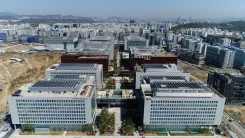Have Corporate Retirement Pension Funds in S. Korea Reached $317 Billion in 2024?

Synopsis
In 2024, South Korea's corporate retirement pension funds soared to $317 billion, marking a historic increase since 2005, though investment returns have dipped. Explore the implications of this growth and the rising trend of employees opting for monthly pension payments.
Key Takeaways
- Corporate retirement pension funds reached 431.7 trillion won in 2024.
- Funds grew by 12.9 percent from the previous year.
- Average return on investment fell to 4.77 percent.
- 13 percent of retirees opted for monthly payments in 2024.
- AI adoption challenges persist among South Korean exporters.
Seoul, June 9 (NationPress) Corporate retirement pension funds surged by nearly 13 percent compared to the previous year in 2024, surpassing the 400 trillion-won threshold for the first time since their inception in 2005, even as their investment returns witnessed a decline, as per data released on Monday.
The total value of corporate retirement pension funds under management reached 431.7 trillion won (approximately US$317 billion) by the end of 2024, reflecting an increase of 49.3 trillion won, or 12.9 percent, from the previous year, according to the Financial Supervisory Service data reported by the Yonhap news agency.
In 2023, the funds experienced an average return of 4.77 percent on investments, a decrease from 5.26 percent the year prior.
The five-year average return on investment stood at 2.86 percent by the end of 2024, with a ten-year average of 2.31 percent.
The corporate pension scheme, launched in 2005, allows employees to opt for either a lump-sum payout or monthly installments post-retirement.
As of 2024, among approximately 573,000 individuals who received or initiated payments from their corporate pension plans, 13 percent selected monthly payments over a one-time payout.
This percentage has steadily increased from 10.4 percent in 2023 and 7.1 percent in 2022.
In a separate note, a significant number of South Korean exporters acknowledge the necessity of integrating artificial intelligence (AI) into their operations to enhance efficiency; however, only a minor segment is actively implementing the technology, according to a survey released on Monday.
The survey, conducted from February 17-19 by the Korea International Trade Association (KITA), revealed that 78 percent of 396 respondents from the export sector believe AI adoption is crucial, yet only 16.9 percent reported actively using AI to enhance productivity or manage tasks.
Furthermore, 68.7 percent indicated they are either employing AI limitedly or are still contemplating its application.
The survey also highlighted that 21.9 percent of AI-utilizing companies apply such technologies in marketing and branding, while 19.7 percent use AI for planning and product development.
Challenges such as cost burdens (cited by 26.1 percent) and a lack of skilled personnel (noted by 25.4 percent) were identified as the primary obstacles to AI adoption.
KITA pointed out the absence of refined data and necessary infrastructure for industrial AI utilization, advocating for a gradual approach to promote AI adoption among exporters.








